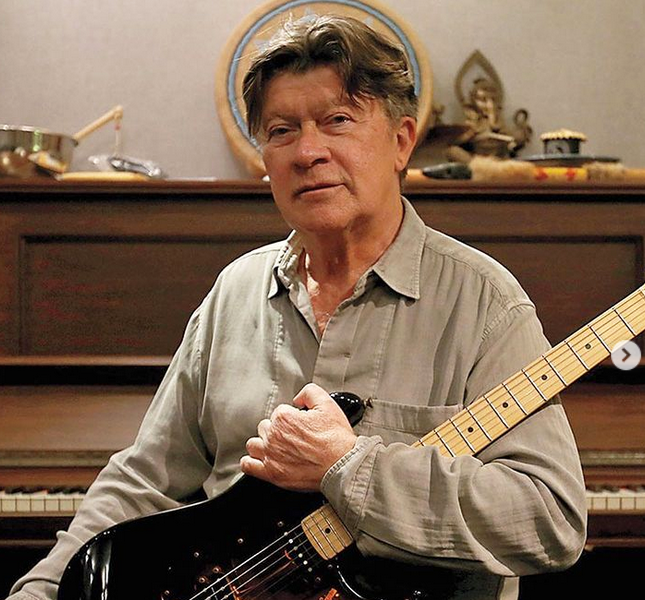Among the musicians who inspired Prince George singer/songwriter Marcel Gagnon to pick up a guitar and play, none had a more profound effect than Robbie Robertson.
Robertson, who died last week at age 80, drew on his Indigenous roots to shape an illustrious career that brought worldwide fame and fortune to the Canadian artist as a rock music icon.
Best known for his work as the guitarist for The Band, Bob Dylan’s backing band, and their star-studded sendoff concert, The Last Waltz, it was Robertson’s solo material and songs like Unbound, Sacrifice, Stomp Dance (Unity) and Peyote Healing, all shaped by the music of his ancestors, that showed Gagnon the way as an artist.
For Gagnon, nominated for a Juno Award in 2002 for Best Music of Aboriginal Canada his debut album Crazy Maker, the power of Robertson’s music touched his soul.
“His stuff with The Band, and Bob Dylan was all wonderful, but I think throughout the whole thing he was really looking for who he truly was in music and I think he found it when he created the Underworld of Red Boy,” said Gagnon. “That’s the core of who Robbie Robertson was, in my view.
“That album meant so much to me, it influenced everything about my music when I started to write that Crazy Maker, album, it was Robbie Robertson’s influence. I never wrote his style or anything, it was just remembering the songs. His music is the type of music that slowly, over time, will take its place at the highest level of music throughout the world.“
Gagnon is a substance abuse counselor and, in his work with prison inmates as a Lheidli T’enneh elder who teaches spirituality, he uses Robertson’s music to set the mood for traditional ceremonies at the jail.
“I would plug in the Robbie Robertson CD when the guys were coming in to do a ceremony and they’d be talking and laughing and some of them ever swearing, but as soon as they got through that door and heard the music there was silence,” said Gagnon. “They would all walk in very quietly. I’m talking young guys who were supposed to be into heavy rap and hip-hop, and that’s what it did to them.
“He didn’t write from what he saw, he wrote from things that were inside him that affected him emotionally and he brought that emotion out so other people can relate to it. It was just incredible, to me, that album is the highlight of who he was.”
Robertson was the son of a Mohawk mother and was first inspired to pick up a guitar at age 10 after hearing his relatives play traditional music on the Six Nations reserve in southern Ontario. Combining electronica/techno hip-hop looping beats with native North American drumming and singing, he made traditional songs mainstream and brought them to a mass audience.
He made two albums in the 1990s with the Red Road Ensemble, a group of Indigenous musicians.
The first - Music For Native North Americans, came out in 1994 and followed on the heels of his wildly successful 1987 self-titled solo debut, which contained the hit Somewhere Down the Crazy River - and he released Underworld of Red Boy in 1998. Red Boy refers to the only derogatory term Robertson was ever called.
As one of the leaders of the UHNBC Traditional Drummers, Wesley Mitchell brings traditional songs with the Monday Night Drum Group to Prince George hospital to lift the spirits of staff and patients and pay tribute to the healthcare system. They draw from the same influences as Robertson did with his songs Cherokee Morning Song, Coyote Dance and Makhk Jchi (Heartbeat Drum Song) from the Music For Native Americans album.
“It’s a sad day, but when a musician has lived 80 turns around the sun here on Planet Earth and has given his all to creative arts with the band and going solo, one thing that sticks out for me is he took care of his band members,” said Mitchell.
“Being Indigenous and keeping people on that red road, clean and sober, he did that for his members to the best of his ability and he wrote songs. All those songs, when you sit back at home listening, you just enjoy your surroundings and that’s what I get from his songs – the beauty of Mother Earth and the beauty of being a human being experiencing a spiritual life.
“He’s an icon and he led the way for songwriting and taking the lead in guitar. It’s just a way to express yourself and I can relate, for what the drum has done for me to express myself and find a voice and be part of the community. It brings joy and it brings happiness to express yourself through an instrument.”



